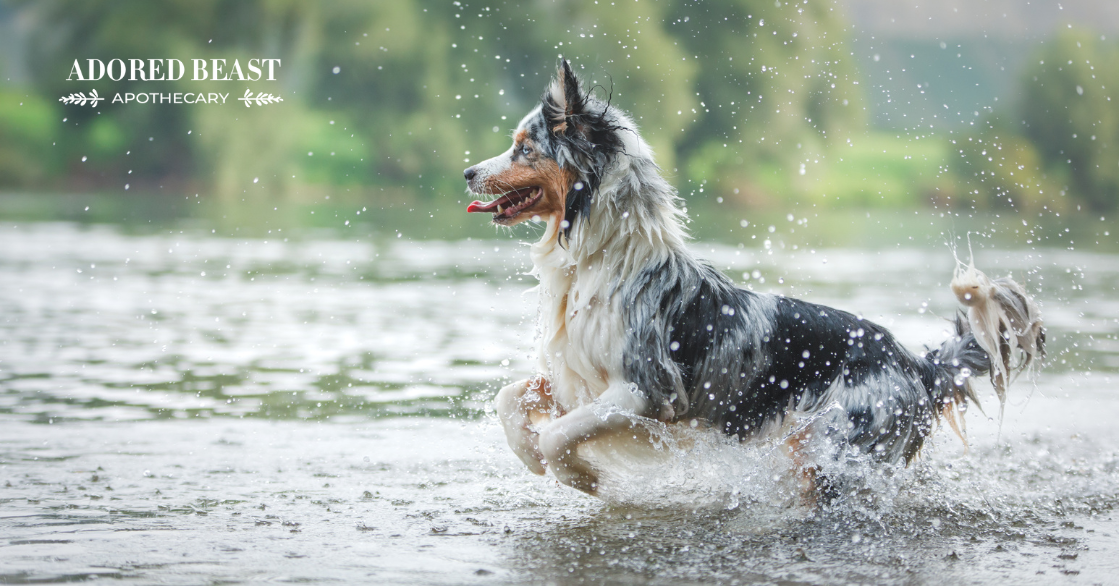At Adored Beast Apothecary, we’re always on the lookout for the newest, most thorough, up-to-date research and data available. We know that things change every day, and new research enlightens us and gives us even more power to give our pets the best.
And for the last few years, a lot of our own research has centered around omegas, and algae oil, and the benefits of algae oil for pets. Much of this focus stems from what we now know to be the impact on our oceans
Omega-3s have long been a supplement for our animals that most pet parents know are essential. So, what are the benefits of algae oil for dogs and cats? And how can we know we’re giving a sustainable product?
Benefits of Algae Oil for Dogs and Cats
Omega-3 oils for dogs are very popular. These fatty acids, in particular docosahexaenoic acid (DHA) and eicosapentaenoic acid (EPA), are well-known for the role they play in maintaining overall health.
And as a rich source of both EPA and DHA, algae oil is a valuable addition to any animal’s diet.
The most important of all the benefits of algae oil for dogs and cats is its role in maintaining balance.
Omega-3s help balance out omega-6s. When our pets consume omega-6s, they’re converted into pro-inflammatory eicosanoids (short burst pro-inflammatory hormones). When the ratio of omega-6s significantly outweighs omega-3s, this creates low-grade to severe systemic inflammation which is the root cause for almost all chronic diseases.
Several different types of marine algae have been shown to be rich in EPA and DHA. So this means they’re providing the same health benefits as fish oil or other marine omega supplements. Additionally, EPA has anti-inflammatory effects, while DHA is vital for eye, brain and nervous system health.
As far as the benefits of algae oil for dogs and cats, there are more than a few! It helps support the health of your animal’s:
- Joints
- Skin and coat
- Heart and cardiovascular system
- Brain
- Eyes
- Nervous System
A Sustainable Alternative
Omega-3 fatty acids are so important for overall health. But if you read our blog about sustainability, you’ll already know that most products come from sources that are not truly sustainable.
Sustainable can be defined as the ability of something to be used as a resource with 0% depletion or damage of the natural world.
And unfortunately, fish, krill, and squid oil just don’t meet that definition. Their impact on ocean life, and therefore all life in general, is just too great to ignore.
Hello Marine Algae!
Thankfully, marine algae grown on land is much more sustainable. Sustainable micro-algae is grown indoors, on land, in large, closed tanks, in the dark. The process is tightly controlled to ensure that no contaminants are introduced. And this is important. Heavy metals like mercury and arsenic are common in ocean products, so you want to make sure these are not making their way into your pet. This make a certified analysis crucial.
The oil is extracted from the algae cells in a natural way without the use of solvents. This cultivation process does not harm the ocean or its ecosystems at all. And that’s great for everyone!
Does it have enough EPA? In recent years, some have challenged algae oil as a source of omega-3s, stating that it just does not have enough EPA and has too much DHA when compared to fish oil, but that’s not actually the case. Research has shown that supplementation with DHA actually increases plasma levels of EPA, by as much as 130%. Researchers were able to conclude that the increases in EPA levels seen upon supplementation with DHA are a result of slowed EPA metabolism, rather than coming from the DHA supplement itself. This evidence suggests that your dog can still get the benefits of EPA via supplementation with DHA.
It’s very important to make sure that it comes from a non-GMO source and that the amounts of omegas are on the bottle. Third party testing is also good to ask for. Glass bottles are the safest to prevent rancidity. And don’t forget to make sure it is grown on land.
The most common use for omega-3 fatty acids in dogs and cats is for pain and inflammation related to osteoarthritis. As far as the benefits of algae oil for dogs and cats, evidence supports its use for inflammatory skin disorders and cardiovascular health as well. When it comes to an omega-3 supplement, a sustainable (grown on land) algae oil delivers the benefits of fish oil without the negative impacts on the oceans. Keeping our pets healthy and helping to support the planet, what’s not to love 🙂












